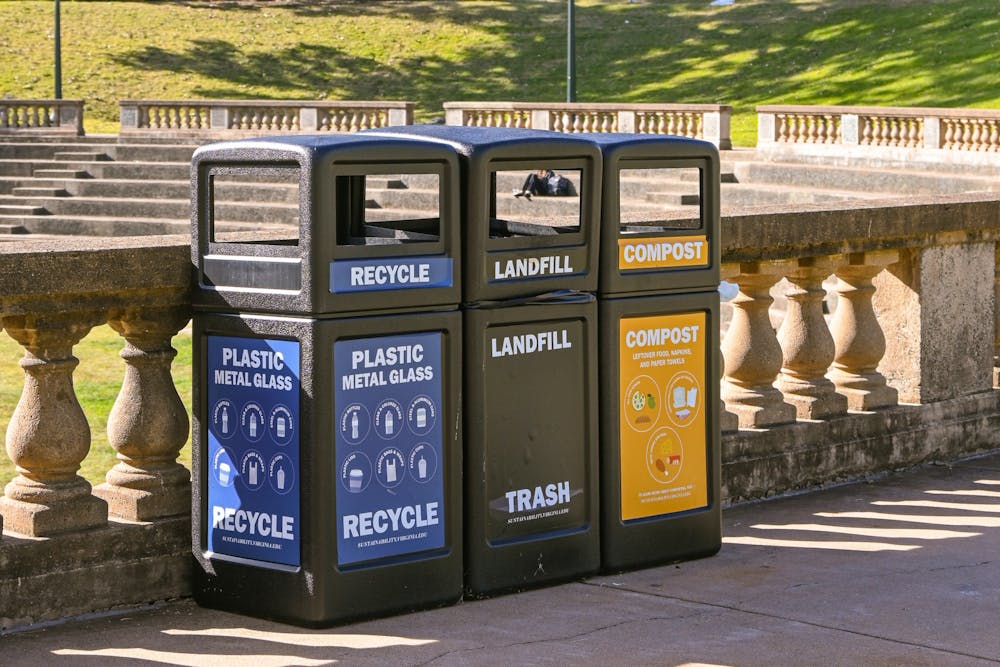U.Va. Sustainability’s zero waste program has increased its commitment to composting and continues to ramp up efforts to raise awareness on what waste can be composted and provide more composting bins on grounds.
Composting is one method of reducing waste by breaking down organic matter into a fertilizer that can be added to enrich the soil. It can strengthen eroded soil by allowing for soil infiltration while reducing the surface flow of water.
Compostable items include all food and plant items, such as fruit and vegetable remains, eggshells and household plant remains, as well as uncoated paper that is not otherwise recyclable, including pizza boxes. Certified compostable products such as corn-based cutlery are also compostable. Further information on composting rules is available on the City of Charlottesville website.
“We say if it grows, it goes — so that includes, obviously, all types of food and paper since it was made from trees and that can be composted,” Black Bear Composting owner Eric Walter said. “Sometimes, people think of paper food packaging, but unless it specifically says that it's compostable, it's lined with plastic and [can't] be composted.”
According to Walter, some students might partake in “wish-cycling,” which involves discarding non-compostable items in the compost bin with the hope that they will be composted.
One solution to reduce wish-cycling at the University is to raise awareness on which products can be composted and which cannot. Aayusha Khanal, U.Va. Sustainability volunteer and third-year College student, said standardizing food containers and utensils to be compostable across the University will help clarify student confusion about what can be composted.
“If [all disposables] from food vendors were compostable, then students would feel a lot more comfortable composting,” Khanal said.
With the composting process happening locally, the rewards of composting are returned to the community — the University, restaurants and local residents who compost with Black Bear Composting get compost returned to them once a year to fertilize their soil. Just last week, compost was dropped off at the Hereford College student garden. One of the main benefits of using compost in gardens and farms is that it reduces the need for chemical fertilizers, making food cleaner and more natural.
The University’s zero-waste program puts these ideas into practice. One of the main goals of the program is to implement compost bins throughout the University. Bin locations include Newcomb, Observatory Hill Dining Hall, West Range Cafe and Hereford. This year, a pilot program to install compost bins near the amphitheater food trucks was made permanent. Their location in a high-traffic area gives students a convenient option to compost their food waste.
Second-year College student Nazifa Rahman said she thinks while composting bins are offered near dorm buildings, they are not convenient enough to ensure that all students have a compost bin in or near their specific building.
“I think at U.Va., we can definitely do a better job at telling students to actively compost, and having that designated location to compost and recycle would be beneficial,” Rahman said. “So going forward in the future, maybe we could do a weekly go-through of a room and find stuff and even recycle, and that kind of activity would be beneficial.”
Khanal said while the University has made strides in implementing compost bins, it has yet to accurately quantify the amount of compost being collected. Khanal also said she feels it has not spread enough awareness on exactly which products and food waste can be composted, and that lack of awareness leads to the potential for students to compost incorrectly.
As more composting bins are added throughout Grounds, it becomes increasingly important to have clear statistics on the pounds of compost collected from these sites to allow the University to quantify the impact of these changes.
Data obtained from Black Bear Composting shows that the compost collected from the University increased from 215 to 320 tons between 2020 and 2021. This year, the University seems to be on track of beating the amount of compost collected in 2021, with 185 tons collected through June 30.
However, one goal of the U.Va. Sustainability’s zero waste program that has yet to be actualized is quantifying the amount of compost that University students produce.
“We solely measure how many bags of compost we collect, which isn’t the most accurate form,” Khanal said. “It’s a bit difficult because we are relying on student volunteers and there are a limited number of them.”
There are a variety of ways for off-Grounds Charlottesville residents to compost. Black Bear Composting offers monthly subscriptions for $22.25, which includes weekly home compost pickup. Black Bear will also provide subscribers with finished compost at least once a year for personal use in home gardens. There are currently over 1,000 subscribers to this service.
Two free Charlottesville composting locations are the McIntire Recycling Center and the City Market, which runs from April to October. Taking advantage of these programs can be an important step towards reducing your personal carbon footprint.
“If compost goes to the garbage, it can actually cause harm because in the landfill, things that can break down — biodegradable materials like food and yard waste — will actually create methane, which is a greenhouse gas that's 20 times worse than CO2,” Walter said.







